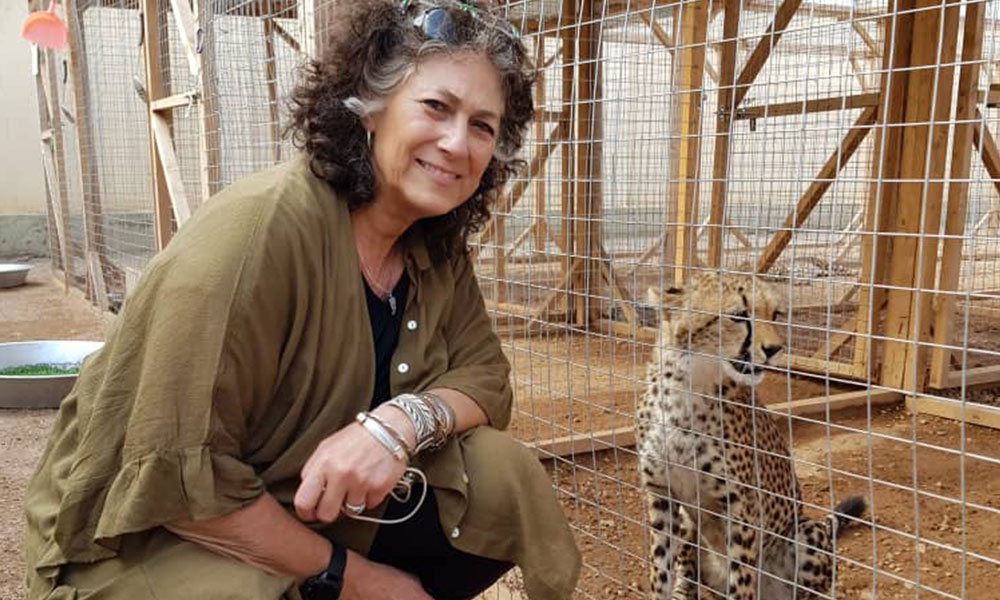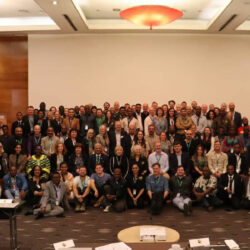Cheetah Conservation Fund Founder and Executive Director Tours the United States to Raise Awareness and Funds to Assure the Survival of the Species
-

- by CCF Staff September 18, 2019
For Immediate Release
Cheetah Conservation Fund Founder and Executive Director Tours the United States to Raise Awareness and Funds to Assure the Survival of the Species
WASHINGTON, D.C. (September 18, 2019) – Cheetah Conservation Fund (CCF) Founder and Executive Director Dr. Laurie Marker will launch a six-week tour with public and private speaking engagements in the U.S. with CCF’s annual open session board meeting at the Bronx Zoo September 19, 2019. This year CCF celebrates “The Year of the Livestock Guarding Dog” in honor of the 25th anniversary of CCF’s successful program that places Kangal and Anatolian shepherd dogs with Namibian farmers to help protect goats and sheep against predation on farmlands that are also habitat for predators like the cheetah. CCF dogs are the single-most effective, non-lethal, predator control tool available for farmers, and they are credited for sparing the lives of hundreds of cheetah and many other carnivore species.
On the fall tour, Dr. Marker will speak about the progress achieved at CCF’s Field Research and Education Centre in Namibia, and the growing crisis caused by the Illegal Wildlife Trade (IWT) for the already vulnerable, small and fragmented cheetah populations in the Horn of Africa. By increasing public awareness of the species’ situation in the wild, Dr. Marker hopes to inspire people to action and enlist their support for CCF’s conservation programs. Dr. Marker’s highly successful initiatives developed over her 40-plus-year career include Future Farmers of Africa, a livelihood development training program that has awarded certificates to more than 12,000 Namibian farmers, and Future Conservationists of Africa (FCA), a wildlife education program for young learners. FCA includes outreach in schools, public events and overnight intensive experiences at the CCF Centre. These programs have resulted in a win-win for the cheetah and the local community, wildlife, and Namibian economy. Otjiwarongo, the town where CCF is based, has become known as the “Cheetah Capital of the World” thanks to the work of CCF.
During 2019, Dr. Marker has spent much of her time in Somaliland where CCF is now caring for 30 orphaned cheetah cubs confiscated from the illegal wildlife trade. Research shows an estimated ~300 young cheetahs are trafficked out of the Horn of Africa each year, taken from a population of about 300 adult and adolescent cheetahs in parts of Ethiopia, northern Kenya, Somalia and Somaliland. With increased enforcement by the Republic of Somaliland Ministry of Environment and Rural Development, more cubs are being recovered and placed in the care of CCF. The illegal trade in cheetah and CCF’s temporary holding facility for intercepted cubs in Hargeisa, Somaliland’s capital, was included in a CNN news report August 28, 2019.
“If you do the math, it’s only going to be a matter of a couple of years before we lose all the cheetahs in the Horn of Africa,” said Dr. Marker. “People need to understand the situation is dire, and this presents a serious threat to the cheetah’s ability to outrun extinction. Please help us stop this threat while we still have time.”

Public events will be held in the following cities:
September 19-20 – Bronx, NY
September 29 – Portland, OR
October 8 – Santa Cruz, CA
October 10 – Santa Rosa, CA
October 12 – San Francisco, CA
October 13 – Walnut Creek, CA
October 15 – Oakland, CA
October 18 – Indianapolis, IN
October 21 – Washington, DC
October 25 – Columbus, OH
October 27 – Oklahoma City, OK
Please visit www.cheetah.org for events and ticket information.
Dr. Marker is available for media interviews while in the U.S. Media is invited to cover presentations.
Dr. Laurie Marker is an American scientist, widely recognized as the leading expert on the cheetah. Dr. Marker began her in-situ research in Namibia in 1977, and founded Cheetah Conservation Fund in 1990. From humble beginnings in a tiny farmhouse in rural Namibia to an unparalleled conservation model for predator conservation, Dr. Marker has built a world-renowned organization. She is a recipient of the Tyler Prize for Environmental Achievement, the Tech Museum’s Intel Environmental Prize, and a two-time finalist for the Indianapolis Prize. She was named a Hero for the Planet by Time magazine, has been featured in Smithsonian magazine and National Geographic, and on numerous television shows, including The Tonight Show, Good Morning America, CNN and the Today Show.
About CCF:
CCF is an international non-profit organization headquartered in Namibia, with operations in the United States, Canada, Australia, Italy, Belgium and the United Kingdom, and partner organizations in several other nations. Founded in Namibia in 1990, Cheetah Conservation Fund (CCF) is the global leader in research and conservation of cheetahs and dedicated to saving the cheetah in the wild. CCF’s mission is to be the internationally recognized center of excellence in the conservation of cheetahs and their ecosystems, working with all stakeholders to develop best practices in research, education, and land use to benefit all species, including humans. Learn more at www.cheetah.org.
CCF and IWT:
Since 2005, Cheetah Conservation Fund (CCF) began tracking cheetah trafficking and assisting authorities with confiscations whenever possible. To date, CCF has recorded hundreds of incidents involving more than 1,500 cheetahs. Of these, less than 20% are known to have survived, while more than 30% were confirmed dead. Most of the trade in live cheetahs occurs between East Africa and the Arabian Peninsula, where cheetahs are popular pets across the Gulf States. Trafficked cheetahs are believed to originate in Ethiopia, northern Kenya, Somalia and Somaliland, and they are smuggled mostly into Yemen from points on the Somaliland coast.
# # #
MEDIA CONTACT:
Susan Yannetti, susan@cheetah.org or 202.716.7756
Related Reading


